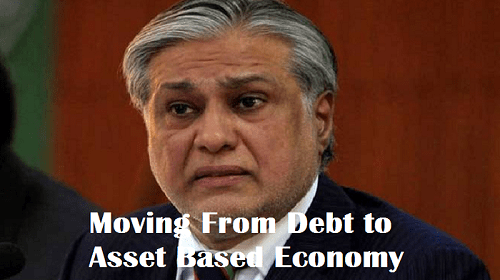Gravitating From Debt to Asset Based Economy: Pakistan Sovereign Wealth Fund
The Pakistani government has recently taken significant steps to establish the Pakistan Sovereign Wealth Fund, aiming to utilize state assets worth Rs2.3 trillion for capital investments. According to senior finance ministry officials, at least seven state assets have been identified for transfer into this new fund, with the potential to raise funds through share sales and generate capital for investment.
The final stages of setting up the Pakistan Sovereign Wealth Fund are underway, and the government plans to introduce an Act of Parliament to formalize the fund's establishment, potentially in the coming week.

The new sovereign fund is planned to be exempted from three core laws, including the Privatisation Commission Ordinance, Public Procurement Regulatory Authority Ordinance, and the State-Owned Enterprises (SOE) Act, 2023. This exemption indicates the government's intent to quickly sell some of the identified assets or utilize them to raise loans for strategic investments.
Notably, the Abu Dhabi Investment Authority (ADIA), valued at $850 billion, has provided technical assistance to Pakistan during the drafting process of the law governing the fund.
The Pakistan Sovereign Wealth Fund will be entirely owned by the federal government, and the initial capital will be sourced from the transfer of shareholding of the State-Owned Enterprises (SOEs).
Among the assets planned to be transferred into the fund are prominent state-owned entities such as Oil and Gas Development Company Limited (OGDCL), Pakistan Petroleum Limited, National Bank of Pakistan, Pakistan Development Fund, Government Holdings Private Limited, Mari Petroleum Company Limited, and Neelum Jhelum Hydro Power Company Limited, collectively contributing a net worth of Rs2.3 trillion.
The initiative has caught the interest of the United Arab Emirates (UAE), which has previously shown interest in acquiring stakes in Pakistan's oil and gas sector companies, potentially opening doors for divesting shares of these assets.
Pakistan's economic relations with the UAE have been on an upward trajectory, with significant developments such as the planned transfer of 85% of the east wharf of the Karachi port to the Abu Dhabi Ports. Additionally, the government is pushing for a Comprehensive Economic Partnership Act (CEPA) with the UAE, garnering mixed reactions from the Pakistan Business Council.
Moreover, the latest International Monetary Fund (IMF) staff level report highlights the sale of state-owned assets to official bilateral creditors and foreign sovereign wealth funds.
Finance Minister Ishaq Dar chaired a meeting to finalize the broad parameters, utility, governance structure, and transactions flow of the Pakistan Sovereign Wealth Fund (PSWF), which will adhere to international standards, policies, and practices for optimal leveraging and asset management.
The new fund is intended to facilitate direct investments in both existing and new projects, leveraging against existing assets, and forging joint ventures with private parties, foreign sovereign wealth funds, and governments.
With the arrangement in place for foreign investors, the fund's structure could take various legal forms, such as a company or trusts.
Proceeds from the sale of assets will be allocated as Pakistan's shares in joint ventures across key sectors like agriculture, mining, and information technology, according to officials.
The finance ministry officials emphasized the need for centralizing national assets and developing a comprehensive structure to leverage and generate liquidity, with the aim to attract foreign investment for further growth.
The government's proposal includes establishing a Supervisory Council, chaired by the prime minister, consisting of the finance minister, planning minister, finance secretary, governor of State Bank of Pakistan (SBP), and the chief executive of the fund. This council will oversee the transfer of state-owned enterprises to the sovereign fund.
Additionally, the government will appoint a seven-member advisory committee and a seven-member board to manage the affairs of the new fund. The advisory committee, which may include foreign experts, will play a crucial role in attracting investment and marketing the fund, while the board will be responsible for developing financial, administrative, and investment policies.
The establishment of the Pakistan Sovereign Wealth Fund marks a strategic move by the government to unlock the potential of its valuable state assets and promote economic prosperity through strategic investments and international cooperation. Overall, the step is being hailed as a move in the right direction within the economic circles of Pakistan.
